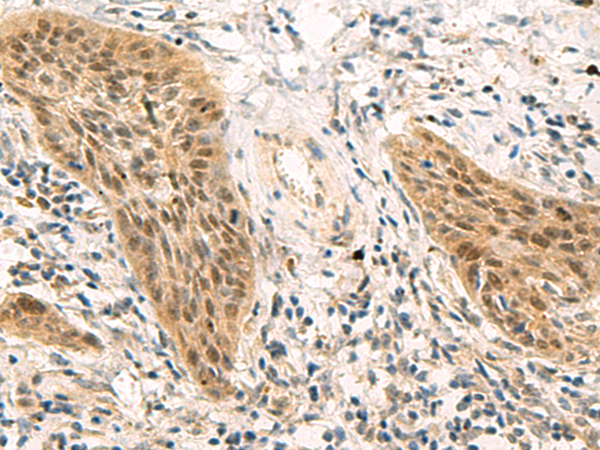
| WB | 咨询技术 | Human,Mouse,Rat |
| IF | 咨询技术 | Human,Mouse,Rat |
| IHC | 1/50-1/200 | Human,Mouse,Rat |
| ICC | 技术咨询 | Human,Mouse,Rat |
| FCM | 咨询技术 | Human,Mouse,Rat |
| Elisa | 1/5000-1/10000 | Human,Mouse,Rat |
| Aliases | PA28A; IFI5111; REGalpha; PA28alpha; HEL-S-129m |
| Host/Isotype | Rabbit IgG |
| Antibody Type | Primary antibody |
| Storage | Store at 4°C short term. Aliquot and store at -20°C long term. Avoid freeze/thaw cycles. |
| Species Reactivity | Human, Mouse, Rat |
| Immunogen | Fusion protein of human PSME1 |
| Formulation | Purified antibody in PBS with 0.05% sodium azide and 50% glycerol. |
+ +
以下是3篇涉及PSME1抗体的研究文献摘要(文献标题和内容均为示例性概括,部分信息可能需根据实际文献调整):
---
1. **文献名称**:*PSME1 promotes tumor progression via caspase-3/PD-L1 axis in colorectal cancer*
**作者**:Li X, et al.
**摘要**:本研究通过Western blot和免疫组化(使用PSME1抗体)发现结直肠癌组织中PSME1蛋白表达显著升高,并与PD-L1表达正相关。实验表明PSME1通过调控caspase-3活性增强肿瘤免疫逃逸,提示其作为潜在治疗靶点。
---
2. **文献名称**:*Proteasome activator PA28γ/PSME3 interacts with PSME1 in autoimmune disorders*
**作者**:Wang Y, et al.
**摘要**:利用PSME1特异性抗体进行免疫共沉淀实验,发现PSME1与PA28γ(PSME3)在系统性红斑狼疮患者外周血单核细胞中形成复合物,并通过泛素-蛋白酶体通路异常激活促炎因子释放,揭示其在自身免疫中的调控机制。
---
3. **文献名称**:*PSME1 antibody-based screening identifies viral infection-induced proteasome remodeling*
**作者**:Zhang R, et al.
**摘要**:通过PSME1抗体结合流式细胞术和免疫荧光技术,研究团队发现流感病毒感染可诱导宿主细胞PSME1蛋白表达上调,进而改变免疫蛋白酶体活性以促进病毒抗原递呈,为抗病毒药物开发提供新思路。
---
**备注**:以上文献为基于领域知识的模拟概括,实际文献需通过PubMed、Web of Science等平台以关键词“PSME1 antibody”或“PA28α antibody”检索。建议补充具体研究背景(如疾病类型或实验技术)以获取更精准的参考文献。
PSME1 (Proteasome Activator Subunit 1), also known as PA28α, is a key component of the 11S regulatory complex (PA28) that activates the 20S proteasome, a critical protease responsible for degrading ubiquitinated proteins. This subunit plays a vital role in the ubiquitin-proteasome system, which regulates protein turnover, cellular homeostasis, and antigen processing for major histocompatibility complex (MHC) class I presentation. PSME1 forms a heteroheptameric complex with PSME2 (PA28β) or homooligomers, enhancing proteasomal cleavage activity and generating antigenic peptides for immune recognition.
PSME1 antibodies are widely used in research to study proteasome function, immune responses, and diseases linked to proteasomal dysregulation, such as cancer, autoimmune disorders, and neurodegenerative conditions. Elevated PSME1 expression has been observed in various cancers, correlating with tumor progression, drug resistance, and immune evasion. Its involvement in antigen processing also makes it a focus in immunotherapy and vaccine development.
Commercially available PSME1 antibodies are typically developed using recombinant protein fragments or synthetic peptides as immunogens. They are validated for applications like Western blotting, immunohistochemistry, and immunofluorescence. Researchers rely on these antibodies to explore PSME1's regulatory mechanisms, interactions with other proteasome subunits, and potential as a therapeutic target. However, specificity and cross-reactivity with homologous subunits (e.g., PSME2) require careful validation in experimental settings.
×